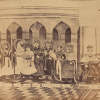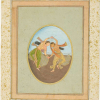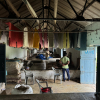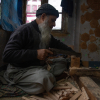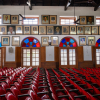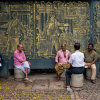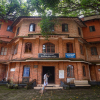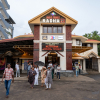Rama Kausalya: Chandrasekhar Nattuvanar hails from the great family of Thanjai Nalvar (Tanjore Quartet). He is the eighth generation of this illustrious family of Tanjore Nattuvanars. Right from Gangaimuthu Nattuvanar, the family’s contribution to music and dance is immense.
Tell us about your ancestors.
K.P.K. Chandrashekar: Gangaimuthu Nattuvanar was the grandfather of the Tanjavur Quartet. The famous quartet—Chinniah, Ponniah, Sivanandam and Vadivelu were the sons of Subbarayan. I belong to Chinniah’s lineage and this great man was the great grandfather of my granddad Ponniah. My father is the famous guru, Kittappa Pillai. Thus our family has been doing its part in fostering dance and music for generations together. During its early days, bharatanatyam in its present form was performed only in the courts of kings and in temples. Before that, it was practised in other forms like koothu, sooladhi or prabhandam. Before the period of the Tanjavur Quartet, there were hymns composed based on the Tanjavur kovil sampradaya (temple rituals of the Tanjavur temple) and these were called the Navasandhi Kauthuvams.
R.K.: Tell us more about Navasandhi Kauthuvams.
K.P.K.: They are hymns, sung right at the commencement of a temple festival, in praise of Ashtadigbalagas (guardians of eight directions), seeking their blessings for the success of the event. These hymns are in the praise of Lords Brahma, Indira, Yama, Agni, Nirudhi, Varuna, Vayu, Kubera and Isana. Navasandhi Kauthuvams were composed by Gangaimuthu Nattuvanar based on the specific raga and tala that is relevant to the deity being appeased. And to this date, our family sings this during all temple festivals.
R.K.: How does your family serve the temple?
K.P.K.: We are engaged in the nattu-muttu sevai (dance and music service) of the temples.
R.K.: What about your ancestors?
K.P.K.: They were all oduvamoorthys (singers in temples) before the period of Tanjore Quartet. Later they performed in the courts of rajas and in temples. They were engaged in chinnamelam and periyamelam sampradaya. Chinnamelam is nattiyam and nattuvangam and periyamelam is tavil and nadaswaram.
R.K.: What was the contribution of the Nalvars to dance?
K.P.K.: It was the Nalvars who decided to bring the dance form, hitherto confined to temples and courts, to public platforms. They brought the bharatanatyam dance to stage and added entertainment elements as adagu, alarippu, jatiswaram, shabdam, padhavarnam, javali etc. so that it could be performed on stage. They travelled a lot and composed hymns on various deities and kings at different places.
R.K.: Where did they learn?
K.P.K.: The Thanjai Nalvars learnt music from Muthuswamy Dikshitar (one of the Carnatic Music Trinity) for over seven years in his gurukulam. As a mark of gratitude, they dedicated their first composition of nine kirthanas, called the Navaratna Mala, to their guru. Muthuswamy Dikshitar was a devotee of Lord Muruga and the Nalvars were devotees of Lord Brihadisvara. So, in all their compositions, the Nalvars kept the mudhra, maa guru guha dasa, as a mark of respect to their guru. They composed quite a lot of padavarnams that even their guru appreciated as being better than his own.
R.K.: Could you talk about the Thanjai Nalvars?
K.P.K.: All were geniuses. Each one of them composed one line of any hymns. All of them were so synchronized in their way of thinking that they could easily carry on the thought of the other. Vadivelu served in Travancore court while Chinniah was patronised by the king of Mysore. Violin is a western music instrument. Vadivelu Pillai learnt it from a Christian priest in Tanjavur court and ventured to play Carnatic music on it. He brought the violin such recognition that it was accepted as an accompaniment in Carnatic music concerts, so much so that today it has the status of a standalone instrument too. To honour this unique feat of Vadivelu Pillai, Travancore king Swati Tirunal gifted him a golden violin in 1934, which is the pride of the family.
R.K.: Does the tradition of composing songs still continue in the family?
K.P.K.: Yes, my father composed a lot of songs. So did my grandfather. Ponniah thatha (grandfather), who was the principal at Raja Annamalai college, also wrote several songs.
R.K.: What was your father’s (Kittappa Pillai) contribution?
K.P.K.: It was my father who actually popularized Navasandhi. Though they had been written quite some time ago, he took special efforts to choreograph Navasandhi Kauthuvams with one of his students called Padmalochani in Bangalore.
R.K.: What are the efforts your family have taken to preserve and popularize the series of songs composed by your ancestors?
K.P.K.: First of all they were all written in palm manuscripts including the ones by Vadivelu thatha. Later handwritten copies appeared. We have brought out most of them in print.
R.K.: Tell us about your great-grandfather.
K.P.K.: Meenakshi Sundaram Pillai thatha was my father’s guru. His disciples included Rukmini Devi Arundale, Mrinalani Sarabhai, Ramgopal, Pandanallur Subbarayan Pillai, Swaminathan Pillai etc.
R.K.: What was his contribution to the Kalakshetra Foundation?
K.P.K.: Meenakshi Sundaram and Chokkalingam Pillai extended all their support to Rukmini Devi to help set up the Kalakshetra college.
R.K.: Tell us about the books that you have brought out.
K.P.K.: My dad and his brother brought out their first book in 1961 at one of the concerts of Mrinalini Sarabhai. Then the javalis composed by Chinniah Pillai, one of the Nalvars, was also published later as a book. My father also brought out books on Navasandhi Kauthuvam, Navaratnamala, Tamil kirtanas etc.
R.K.: It is an amazing contribution by your father and his cousin to have brought out all your family compositions of jatiswarams and nattiya vrittams in the form of printed books for the public at large. How are you adding your bit to it?
K.P.K.: I am now teaching all these to as many students as I can. I work in the Government Music School here.
R.K.: We haven’t talked about kuravanjis.
K.P.K.: Kuravanji is a type of dance drama. The story goes that one of his court poets of Tanjavur's Serfoji king, Kottiyur Sivakozhundu Desigar, composed a kuravanji called Sarabhendra Bhoopala Kuravanji. The Tanjore Quartet gave it a musical form and it has been performed in temples since then along with Navasandhi. This happens mainly during the Brahmotsavam festival when our family receives special honour from the temple on its eighth day.
R.K.: Anything else you would like to say about your family?
K.P.K.: My father had many disciples in Bangalore and the noted ones among them are Vyjayanthi Mala Bali, Sudharani Raghupathy, Shankara Narayanan, Srividya Rangarajan etc. All our ancestors were held in great respect by the kings of their times. We are also in talks with publication houses to print our ancestral manuscripts.

